SMRU in the News
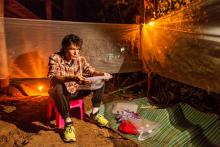 |
Nature: All-nighter: staying up to fight malariaEvery year, my team and I collect mosquitoes at about a dozen villages in Kayin state, Myanmar, a conflict zone near the Thai border. Run by the Shoklo Malaria Research Unit, based in Mae Sot, Thailand, it's one of the largest operations of its kind in the world. It looks like I'm working alone in this picture. In reality, I'm with a team of about 50 people. Most of the collection is done by... |
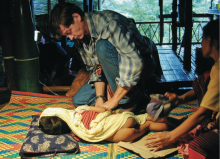 |
Science: The Dour Frenchman on Malaria’s FrontierWhen he arrived at the dangerous Thai-Burmese border in 1984, François Nosten barely knew what research was. Today, he’s one of the world’s top malaria scientists. You’d think that a malaria scientist in François Nosten’s position would need lots of charm and excellent diplomatic skills. He’s a foreigner working in Thailand, a country where smiling seems a prerequisite for getting anything... |
 |
MORU: Clare Ling awarded honorary FRCPathDr Clare Ling has been made an honorary Fellow of the Royal College of Pathologists (FRCPath). Currently running Shoklo Malaria Research Unit (SMRU) Microbiology department and supporting the unit’s molecular activities, Clare is a clinical scientist who has worked at SMRU on the Thai-Myanmar border since 2012. |
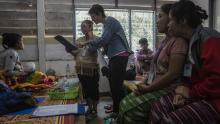 |
Initiative 5%: Health Systems Strengthening for Marginalized and Undocumented Migrants in Tak Province, Thailand: A Focus on Sexual and Reproductive Health NeedsAs of 2019, the total number of registered migrants in Thailand was estimated at over 3.0 million, hailing from Myanmar, Cambodia, and Laos. The estimated percentage of registered migrants in Thailand that are women hovers around 40-45%. According to International Office for Migration (IOM) in Thailand, the number of registered Myanmar migrant workers in Thailand is estimated to be at least 2.... |
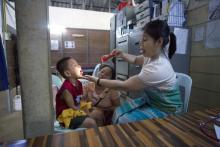 |
Frontier Myanmar: The disease burden on the Thai-Myanmar borderDebilitating mosquito-borne diseases pose an increasing threat to migrant workers and refugees just across the border in Thailand, where clinics running on dwindling foreign aid struggle to meet needs. |
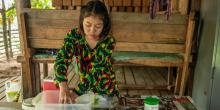 |
La Libre: Le Bassin du Mékong : bombe à retardement dans la guerre contre le paludisme ?La conférence de recapitalisation du Global Fund, principal financeur de la lutte contre le paludisme dans le monde, se clôture ce jeudi à Lyon. |
 |
OZY: Fighting Drug-Resistant Malaria Where it Lives“We don’t need to panic, but we need to be fast,” says Dr. François Nosten, director of the Shoklo Malaria Research Unit (SMRU), a research institute for malaria on the border between Thailand and Myanmar, as he leans back in his chair and frowns. “If we don’t stop it where it is now, it’s going to spread.” It is a warning that is echoed by scientists across Southeast Asia, where reports of a... |
 |
SEA Junction: Photo & Art Exhibition “In Our Voices: Health & Resilience along the Thailand-Myanmar Border”Despite Thailand having one of the best national healthcare systems in the region, not everyone can access it. Cross-border populations often live in underprivileged conditions and are exposed to infectious diseases such as malaria and tuberculosis. Limitations to health care access, due to geographical, financial, socio-cultural, language or security concerns, preclude effective prevention... |
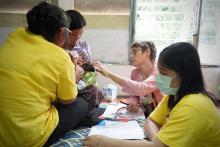 |
Malaria and the doctor who changed the rules of treatmentWhen Professor Rose McGready (MBBS ’90) arrived on the Thai/Myanmar border in 1994, it had been a volatile and dangerous part of the world for many years. Rolling insurgencies against the government from a number of ethnic and political groups created poverty, human rights abuses and the displacement of thousands of Burmese people, many of whom fled... |
|
|
Nature: Malaria’s ticking time bombThrongs of men and women ventured into the forests of northeastern Cambodia in April, lured by a bumper crop of a rare tropical treat called samrong. After days of hiking through the wilderness, some of the travellers returned to their homes with a bounty of the wrinkled seeds, which fetch a high price as a special dessert or an ingredient in traditional Chinese medicine. But many soon fell... |
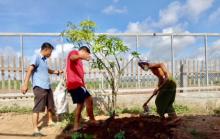 |
World Environment Day, 2018SMRU held several activities for World Environment Day 2018 – largely centered around Kokko TB and METF offices/clinics. Over the last several decades there has been much deforestation in this part of Eastern Karen State and this day provided an opportunity to put a little green back into the landscape. SMRU and Border Health Foundation team members... |
 |
Guardian: Malaria on the march along the Thai-Myanmar border – in picturesIn the absence of a vaccine that works, and against a backdrop of growing drug resistance and dwindling financial support, the global decline in malaria cases has stalled. Physician Alex Kumar visited a research site on the Thai-Myanmar border, where genetic mutations in the parasite causing the disease have rendered treatment ineffective |
|
|
MORU: Videos and Podcasts Getting rid of malaria possible, if we try something new, say expertsThe rapid elimination of potentially untreatable P. falciparum malaria in South-East Asia is possible, according to a ground-breaking new study published today in The Lancet. The study authors say that setting up community-based malaria clinics for early diagnosis, treatment and monitoring, combined with mass antimalarial drug administration (MDA) to everyone living in... |
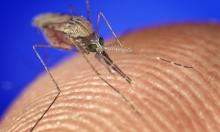 |
Guardian: Dose 'hotspot' populations with anti-malaria drugs to eradicate disease – studyMalaria could be quickly eliminated in south-east Asia by an all-out effort combining early diagnosis and treatment with dosing whole populations in “hotspots” regardless of whether people have symptoms or are healthy, say experts. The radical programme may be the best way to outpace rapidly spreading resistance to anti-malarial drugs, they believe. An experimental programme involving 365,000... |
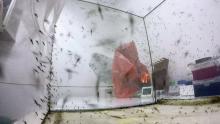 |
ITV: The frontline fight against deadly malaria parasites threatening a new global emergencyITV News has travelled across the world to report on the growing global threat of the spread of deadly drug-resistant 'super bugs'. In the first of our three-part series, we investigate the frontline fight against deadly malaria parasites in South East Asia threatening a new global emergency. The current drugs to fight malaria-carrying mosquitos save millions... |
 |
gatesnotes: Mosquito WarsWe’ve come a long way since the days of blaming the stars. Malaria has terrorized humankind for thousands of years, but for most of that time, we had no idea what caused it. The ancient Greeks thought Sirius the dog star might be responsible. A Chinese medical text from 270 BCE speculated that three demons spread the disease. As recently as the mid-1800s, doctors believed malaria was... |
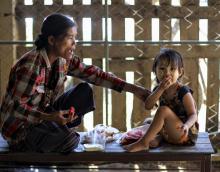 |
Huffington Post: The “Seeing Malaria In Asia Pacific” Project Is Set To Show The Faces of MalariaAt Singapore’s National Library this September 2-29, a photo-documentation exhibit will highlight the humanity behind the horrifying numbers so often associated with malaria. The exhibition, titled “Asia Malaria Images,” is a collaboration between Singapore-based photographer Pearl Gan and Professor J. Kevin Baird, and it’s in association with the Oxford University Clinical Research... |
 |
Burnet Institute: Kerryn Moore awarded Aileen Plant Memorial PrizeBurnet PhD candidate Kerryn Moore has been awarded the Aileen Plant Memorial Prize, with her research expected to transform treatment of pregnant women with malaria globally. She won the prize for a paper on the safety of artemisinin treatment of falciparummalaria in the first trimester of pregnancy, published in ... |
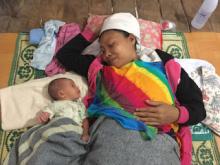 |
The Mermaid's Tale: Reproductive Health Funding and Why it MattersConflict and war can have an enormous impact on demography and population health. When active fighting breaks out in an area it can lead to large and chaotic population movements - if you’ve been paying attention to the news about conflict in the Middle East you’ve most likely seen images of huge populations fleeing countries like Syria and Iraq and the resulting influx of millions of refugees... |
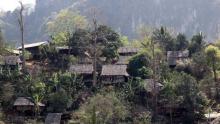 |
BBC: Losing hope in Mae LaOn Thailand's border with Myanmar, also known as Burma, more than 100,000 people live in a string of refugee camps. Many fled ethnic conflict in their homeland decades ago, and have brought up their children here. Gracia Fellmeth arrived in one of the camps a year ago to study depression in women before and after childbirth. After an hour's bus journey through forest from the town of... |
|
|
MORU: Birth attendant training course may be global model for safer birth care in poor communitiesTraining local Karen and Burman women as skilled birth attendants in refugee settings resulted in no adverse perinatal outcomes and many positive outcomes such as a drop in stillbirths and infant deaths and more babies being born in clinics rather than at home, says a new study published in the scientific journal PLOS ONE. Developed on the Thai-Myanmar border, the training... |
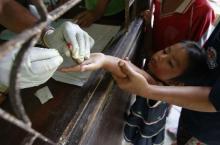 |
DVB: Burma’s battle with malaria … and bureaucracyArtemisinin, long considered to be the miracle drug in the fight against malaria, is losing its grip on the disease in the Mekong region, but perhaps not for the reasons you might think. The science is still sound, and researchers and local groups still work around the clock to tackle the mosquito-borne disease. But the disease is developing resistance in the dense jungle environment of the... |
 |
Myanmar Times: Officials scramble to address drug-resistant malariaAfter a study released last week narrowed the likely cause of drug-resistant malaria along the Myanmar-Thailand border to a mutation in a specific parasite gene, health officials are trying to figure out how best to respond. The culprit, a K13 mutation, has caused the frontline cocktail of drugs (ACT) – a combination of artemisinin and partner medications that has worked for years – to... |
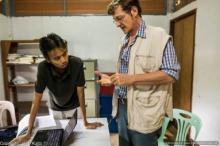 |
Science Chronicle: Artemisinin resistance dents the anti-malaria armourThe emergence of resistance to the artemisinin drug, a potent anti-malarial medicine, now threatens to affect the big gains achieved in recent years in reducing the global burden of malaria — an estimated 1.2 billion fewer malaria cases and 6.2 million fewer malaria deaths globally between 2001 and 2015. This resistance, to artemisinin, becomes all the more dangerous as it has been the “... |
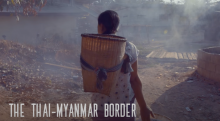 |
The Malaria War: Race Against TimeThe malaria containment effort has failed. All that is left is to attempt malaria elimination before an epidemic spreads across Asia and Africa. |
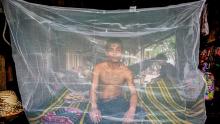 |
Science: Drug resistance triggers war to wipe out malaria in the Mekong regionPAILIN, CAMBODIA—No one knows exactly why resistance to malaria drugs always emerges first in this remote western province of Cambodia, nestled in the Cardamom Mountains. “The reasons are as much social as biological,” says malariologist Tom Peto, who is here in this dusty, unremarkable-looking town battling the latest threat to global malaria control: multiple drug–resistant... |
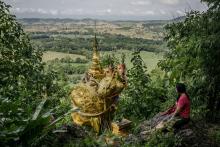 |
Medium: The Unrelenting Specter of Drug-Resistant MalariaFor the last seventy years, malaria could have starred in Groundhog Day. Despite scientists’ best efforts to fight the ancient disease — which today kills over 400,000 people a year — the parasite has remained irritatingly defiant, acting in some places like a recurring villain. After World War 2 ended, malaria was prevalent throughout the world, its spread no doubt aided by... |
|
|
Coconuts Bangkok: The fight against malaria: Is it too late?On a map of Southeast Asia, research scientist François Nosten points to several regions which could trigger a new humanitarian emergency. They include the border areas of Cambodia, Laos, Vietnam, Thailand and Myanmar, where the best weapon to fight malaria — artemisinin — is becoming less effective. And there are no new drugs available to replace it. Nosten, who works at the... |
|
|
Straits Times: Malaria crisis looms as bug mutatesMAE SOT (Thailand) Dr Aung Pyae Phyo drives his old car at breakneck speed from Mae Sot up the winding road between gently undulating bean and sugar cane fields, now mostly harvested and bare, to the village of Wang Pha, where the Moei River, narrow and deep, marks the Thai-Myanmar border. The 39-year-old Myanmar national, who studied medicine at Rangoon University, is now working at... |
|
|
Huffington Post: Burma’s Other Silent Struggle: MalariaDrug-resistant malaria has researchers scrambling for a new drug, but what’s being done to stave off the deadly disease until that drug becomes widely available? A Google search for “Burma” brings up the following result: There you have it. A BBC one-sentence description of the entire country features the phrase, “appalling human rights record.” This is often the prism through which... |
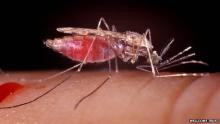 |
BBC: New anti-malaria drug developed at Dundee UniversityResearchers at Dundee University have discovered a new compound which could treat malaria while protecting people from the disease and preventing its spread, all in a single dose. The compound, DDD107498, was developed by the university's Drug Discovery Unit and the Medicines for Malaria Venture. Scientists said the "exciting" new drug could work well against parasites resistant to current... |
|
|
Global Health Now: Mapping Malaria in MyanmarIt’s not quite 8 am in Mae Sot, Thailand, and Francois Nosten’s team is loading up trucks with medical supplies bound for clinics and Burmese refugee camps along the Thai-Myanmar border. “We’re in a bit of a rush,” says Francois Nosten MD, PhD, from his wood-paneled office in Mae Sot. The French-born, former-Médecins Sans Frontières doctor has run this Mahidol Oxford University Research... |
|
|
BBC World Service: Exchanges at the Frontier - Drug Resistant MalariaProfessors Francois Nosten and Nick White have worked for 30 years in Thailand treating patients with malaria and researching treatments. Exchanges at the Frontier travels to the Wangpha Clinic on the Thai-Myanmar border where presenter Gareth Mitchell and a local audience talk to professors Nosten and White about how they seized upon a relatively unknown herb from Chinese medicine, fought for... |
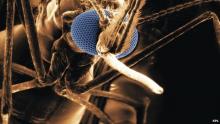 |
BBC News: Malaria on Myanmar-India border is 'huge threat'Resistance to the drug that has saved millions of lives from malaria has been detected over a wider area than previously thought, scientists warn. The ability of the malaria parasite to shrug off the effects of artemisinin has been spreading since it emerged in South East Asia. Tests, published in Lancet Infectious Diseases, now show this resistance on the verge of entering India. Experts said... |
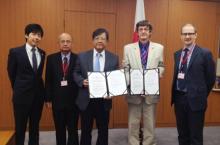 |
EMB-Japan: The Government of Japan Provides Grant Assistance for A Project for the Expansion of Tuberculosis Center in Tak ProvinceThe Government of Japan, under its Grant Assistance for Grassroots Human Security Projects Scheme (GGP), is providing funds amounting to some 2,381,800 baht for A Project for the Expansion of a Tuberculosis Center in Tak Province. On January 12, 2015, H.E. Mr. Shigekazu SATO, Ambassador of Japan and Prof. Francois Nosten, Director of the Shoklo Malaria Research Unit, Mahidol-Oxford... |
|
|
Thomson Reuters: FEATURE: Fight against malaria unites old foes in MyanmarTA GAY LAUNG, Myanmar, Dec 18 (Thomson Reuters Foundation) - In the middle of a bustling village hall in Myanmar's Kayin state, a government health worker pricks the finger of a child to extract a tiny drop of blood for a malaria test. A scene unthinkable just a few years ago, it is now commonplace in an area that used to be blighted by armed conflict between the government and soldiers... |
 |
TWAS: Science diplomats solve world problemsThe diplomats of science combine scientific expertise with political clout to solve major world problems. They fight diseases that plague the developing world, mend frayed international relations, and even bring minds together across borders to expand human knowledge. East and South-East Asia and the Pacific – Francois Nosten, born in France and living in Thailand, is... |
|
|
Thomson Reuters: FEATURE: Drug-resistant malaria: The world's next big health crisis?MIN SAW, Myanmar, Dec 16 (Thomson Reuters Foundation) - Ka Lar Nar caught malaria for the sixth time when he was working away from home on his small farm in the jungle of south-eastern Myanmar but this time it was a lot harder to get rid of it. After testing positive for malaria he got a three-day course of drugs from a community health volunteer in his village but even though his fever... |
|
|
NBC News: Drug-Resistant Malaria Is 'Disaster in the Making,' Expert WarnsMAE SOT, Thailand — Professor Francois Nosten ran his finger over a map showing clusters of tiny dots — each marking a border village that make up ground zero for what experts fear will become the next global health emergency. “It’s already a disaster in the making, and as physicians we have to raise the alarm,” he said. “We have to do something.” Nosten is the director of the... |
|
|
Voice of America: Drug-resistant malaria spreads in Southeast AsiaOn Thailand’s border with Myanmar, also known as Burma, a malaria research and treatment clinic is stepping up efforts to eliminate a drug-resistant form of the parasite - before it spreads abroad. Steve Sandford reports from Mae Sot, Thailand. |
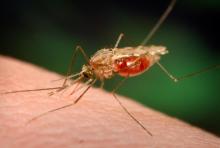 |
Malay Mail: Drug-resistant malaria spiraling out of control, experts warnBlood samples taken from 1,241 malaria patients found that parasites which are resistant to the frontline drug artemisinin have spread to border areas in western and northern Cambodia, eastern Myanmar, Thailand and Vietnam, they said. There also signs of emerging resistance in central Myanmar, southern Laos and northeastern Cambodia, but none in three African states ― Kenya, Nigeria and... |
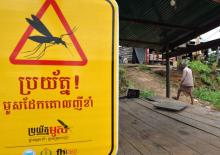 |
Independent: Drug-resistant Malaria Strains Appear Across South East AsiaYears of progress in preventing deaths from malaria could be reversed by the emergence of drug-resistant strains, which are now firmly established across south east Asia, scientists have said. Cases of drug-resistant malaria have surfaced in Thailand, Cambodia, Vietnam and Burma, experts said, warning that urgent action was needed to prevent their spread west into Bangladesh and India... |
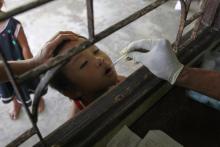 |
Newsweek: Drug-defying malaria cases found in Southeast AsiaIt seems straight out of The X-Files, but the news is terrifyingly real: Drug-resistant malaria-carrying parasites have been found in Cambodia-Thailand border regions, according to a study published Wednesday in The New England Journal of Medicine. This isn’t the first time the parasite has resisted drugs, but experts say this recent development poses a new and serious threat... |
|
|
Shanghai Daily: Drug-resistant malaria widespread in Southeast Asia: studyDrug-resistant malaria is now widespread in Southeast Asia, seriously threatening global efforts to control malaria, a new study warned Wednesday. An analysis of blood samples from 1,241 malaria patients in 10 countries across Asia and Africa found resistance to the world's most effective anti-malarial drug, artemisinin, is now firmly established in western and northern Cambodia, Thailand,... |
|
|
University of Oxford: Drug-resistant malaria has spread across Southeast AsiaResistance to the world's most effective anti-malarial drug, artemisinin, is now widespread across mainland Southeast Asia, seriously threatening global malaria control and elimination, according to a study led by Oxford University researchers based in Thailand. The study, which analysed blood samples from 1241 malaria patients in 10 countries across Asia and Africa, found that... |
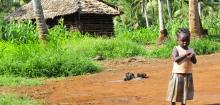 |
University of Oxford: Promising results in efforts to develop new malaria treatmentsAs we report the spread of drug-resistant malaria parasites on our news pages today – and the scale of the threat this poses to global efforts to control malaria – two other studies published today by Oxford University researchers report promising results in developing new drugs and vaccines against malaria. While neither set of results will provide a solution in the short term, it does... |
|
|
Wall Street Journal: Resistance Taking Sting Out of Top Malaria DrugBANGKOK—Resistance to the world's most effective drug against malaria is becoming widespread in Southeast Asia, a recurrent pattern that threatens global efforts to control the mosquito-borne infectious disease, a new study shows. Resistance to the drug, artemisinin, in the most deadly form of malaria-causing parasite, Plasmodium falciparum, is established in northern and western... |
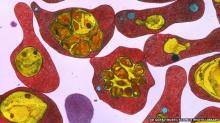 |
BBC News: Call for 'radical action' on drug-resistant malariaDrug-resistant malaria is spreading in South East Asia, and has now reached the Cambodia-Thailand border, according to a study. "Radical action" is needed to prevent further spread of malaria parasites resistant to key drugs, say scientists. The spread could undermine recent gains in malaria control, they report in the New England Journal of Medicine. No evidence was found... |
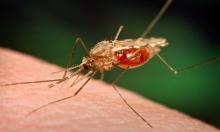 |
Guardian: Malaria experts bid to stamp out disease before parasite becomes drug resistantSome of the world's leading malaria experts are advocating a radical plan to try to stamp out the disease before resistance to the newest and best drugs used to treat it grows too widespread. Malaria parasites resistant to the artemisinin drugs, which have been key to strategies for controlling the disease, are now common in the... |
|
|
Reuters: Drug-resistant malaria reaches Southeast Asia borders, could spread to AfricaLONDON (Reuters) - Drug-resistant malaria parasites have spread to border regions of Southeast Asia, seriously threatening global efforts to control and eliminate the mosquito-borne disease, researchers said on Wednesday. The scientists, who analysed blood samples from 1,241 malaria patients in 10 countries across Asia and Africa, found resistance to the world’s most effective... |
 |
New York Times: How to Beat Malaria, Once and for AllMAE SOT, Thailand — MALARIA is a seasonal disease; with tropical rains come the fevers. In the news media, malaria is also seasonal. Every spring around World Malaria Day we hear about its devastating effects, including deaths in the hundreds of thousands. This year the reports were encouraging: Infections have been reduced and many lives saved. In May, researchers reported in Science that yet... |
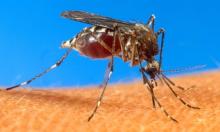 |
Guardian: New wave of drug-resistant malaria threatens millionsWhen an intense fever overcame 50-year-old Daw Cho Cho last spring, she took the same steps as when she last had malaria. Wary of village medicine and aware of the well-funded clinic across the border, she crossed into Thailand from her Burma village and came to the malaria centre for treatment. Seven years ago, her malaria was... |
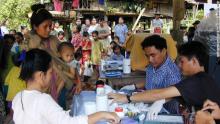 |
CNN: Scientists race to eliminate malaria as 'wonder drug' loses its powersThe meandering Moei river marks the natural boundary between Thailand and Myanmar. Its muddy waters are at their fullest, but Francois Nosten still crosses them in just a minute, aboard a narrow, wooden boat. In the dry season, he could wade across. As he steps onto the western riverbank,... |
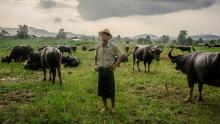 |
Mosaic: How malaria defeats our drugsThe meandering Moei river marks the natural boundary between Thailand and Myanmar. Its muddy waters are at their fullest, but François Nosten still crosses them in just a minute, aboard a narrow, wooden boat. In the dry season, he could wade across. As he steps onto the western riverbank, in Myanmar, he passes no checkpoint and presents no passport. The air is cool. After months of rain... |
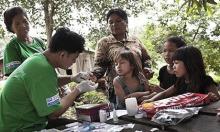 |
Guardian: Drug-resistant malaria on the Cambodian border: a new health challengeAll day long, rickety wooden boats cross the muddy Moie river that separates Burma and Thailand. They deliver the sick to Wang Pha clinic, a whitewashed bungalow on the Thai riverbank – and one of the few clinics in Mae Sot offering free healthcare to Burmese people living on both sides of the border. Many of Wang Pha's patients are invisible to national governments: some are stateless... |
|
|
CCTV: Fears new strain of Malaria could spreadA looming malaria catastrophe" is how some scientists are describing the emergence of a strain of the parasite which is resistant to drugs. It’s been discovered in remote areas of Thailand. Researchers fear- unless they can find out why it’s happening-the resistance could spread, threatening not just Asia but the world. This child is very sick. She has malaria after being bitten by a... |
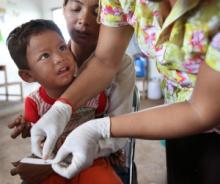 |
Nature: Genome analysis homes in on malaria-drug resistanceResearchers have identified a region of the malaria-parasite genome that underlies resistance to the most effective current treatment. The finding comes as drug resistance seems to be spreading in Southeast Asia. Artemisinin has become the go-to treatment nearly everywhere that malaria is endemic. Resistance to it was first identified in 2005 in western Cambodia. Resistance does not... |

